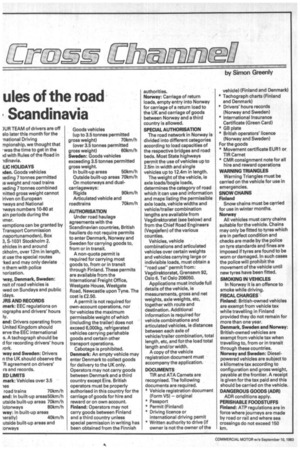ules of the road Scandinavia
Page 46

If you've noticed an error in this article please click here to report it so we can fix it.
by Simon Greenly
)UR TEAM of drivers are off slo later this month for the 'national Driving rnpionship, we thought that • was the time to get in the )d with Rules of the Road in tIC HOLIDAYS
iden. Goods vehicles
:eding 7 tonnes permitted ;s weight and road trains :eding 7 tonnes combined nitted gross weight cannot lriven on European 'mays and National iways numbers 10-80 at am n periods during the imer.
Kemptions can be granted by
Transport Commission insportunamoden), Box 3, S-1031 Stockholm 2.
ehicles in and around ckholm, over 12m in length, 3t use the special routes
-ked and may only deviate
n them with police iorization.
way, Denmark, Sweden: nsit of road vehicles is wed on Sundays and public idays.
JRS AND RECORDS
mark: EEC regulations on
tographs and drivers' hours ly.
and: Drivers operating from
United Kingdom should erve the EEC international s. A tachograph should be d for recording drivers' hours fork.
way and Sweden: Drivers
n the UK should observe the
-R agreement on drivers'
rs and records.
ED LIMITS
mark: Vehicles over 3.5
les
road trains 70km/h and: In built-up areas50km/h utside built-up areas 70km/h lotorways BOkm/h way: In built-up areas
lerally) 40km/h utside built-up areas and :orways Goods vehicles (up to 3.5 tonnes permitted gross weight) 70km/h (over 3.5 tonnes permitted
gross weight) 60km/h Sweden: Goods vehicles exceeding 3.5 tonnes permitted gross weight.
In built-up areas 50km/h Outside built-up areas 70km/h On motorways and dual carriageways: Rigids 90km/h Articulated vehicle and roadtrains 70km/h AUTHORISATION Under road haulage agreements with the Scandinavian countries, British hauliers do not require permits to enter Denmark, Norway and Sweden for carrying goods to, from or in transit.
A non-quota permit is required for carrying most goods to, from or in transit through Finland. These permits are available from the International Freight Office, Westgate House, Westgate Road, Newcastle upon Tyne. The cost is £2.50.
A permit is not required for own-account operations, nor for vehicles the maximum permissible weight of which (including the trailer) does not exceed 6,000kg, refrigerated vehicles carrying perishable goods and certain other transport operations.
Cabotage is prohibited. Denmark: An empty vehicle may enter Denmark to collect goods for delivery to the UK only. Operators may not carry goods between Denmark and a third country except Eire. British operators must be properly authorised in this country for the carriage of goods for hire and reward or on own account. Finland: Operators may not carry goods between Finland and a third country unless special permission in writing has been obtained from the Finnish
authorities.
Norway: Carriage of return loads, empty entry into Norway for carriage of a return load to the UK and carriage of goods between Norway and a third country is allowed.
SPECIAL AUTHORISATION The road network in Norway is divided into different categories according to load capacities of the respective bridges and road beds. Most State highways permit the use of vehicles up to 2.5m in width and single vehicles up to 12.4m in length.
The weight of the vehicle, ie axle loads/bogie loads, determines the category of road which it can use and information and maps listing the permissible axle loads, vehicle widths and vehicle/trailer combination lengths are available from Vegdirelctoratet (see below) and from the Chief Road Engineers (Vegsjefen) of the various counties.
Vehicles, vehicle combinations and articulated vehicles over certain weights and vehicles carrying large or indivisible loads, must obtain a "road use" permit from: Vegdirektoratet, Grensevn 92, Oslo 6. Tel Oslo 206050. Applications must include full details of the vehicle, ie measurements, gross and net weights, axle weights, etc, together with route and destination. Additional information is required for vehicle combinations and articulated vehicles, ie distances between each axle of vehicle/trailer combination, total length, etc, and for the load total length and/or width.
A copy of the vehicle registration document must accompany the application.
DOCUMENTS TIR and ATA Carnets are recognised. The following documents are required.
* Vehicle registration document (Form V5) — original * Passport * Permit (Finland) * Driving licence or international driving pemit * Written authority to drive (if owner is not the owner of the vehicle) (Finland and Denmark) * Tachograph charts (Finland and Denmark) * Drivers' hours records (Norway and Sweden) * International Insurance Certificate (Green Card) * GB plate * British operators' licence (Norway and Sweden) For the goods * Movement certificate EUR1 or TIR Carnet * CMR consignment note for all hire and reward operations WARNING TRIANGLES Warning Triangles must be carried on the vehicle for use in emergencies.
SNOW CHAINS Finland Snow chains must be carried for use in winter months.
Norway All vehicles must carry chains suitable for the vehicle. Chains may only be fitted to tyres which are in perfect condition and checks are made by the police on tyre standards and fines are imposed if tyres are found to be worn or damaged. In such cases the police will prohibit the movement of the vehicle until new tyres have been fitted.
SMOKING IN VEHICLES In Norway it is an offence to smoke while driving.
FISCAL CHARGES
Finland: British-owned vehicles are exempt from vehicle tax while travelling in Finland provided they do not remain for more than one year.
Denmark, Sweden and Norway: British-owned vehicles are exempt from vehicle tax when travelling to, from or in transit through these countries.
Norway and Sweden: Dieselpowered vehicles are subject to a kilometre tax according to configuration and gross weight, payable at the frontier. A receipt is given for the tax paid and this should be carried on the vehicle. DANGEROUS GOODS (ADR) ADR conditions apply. PERISHABLE FOODSTUFFS Finland: ATP regulations are in force where journeys are made by road or rail and where sea crossings do not exceed 150 km.




























































































































